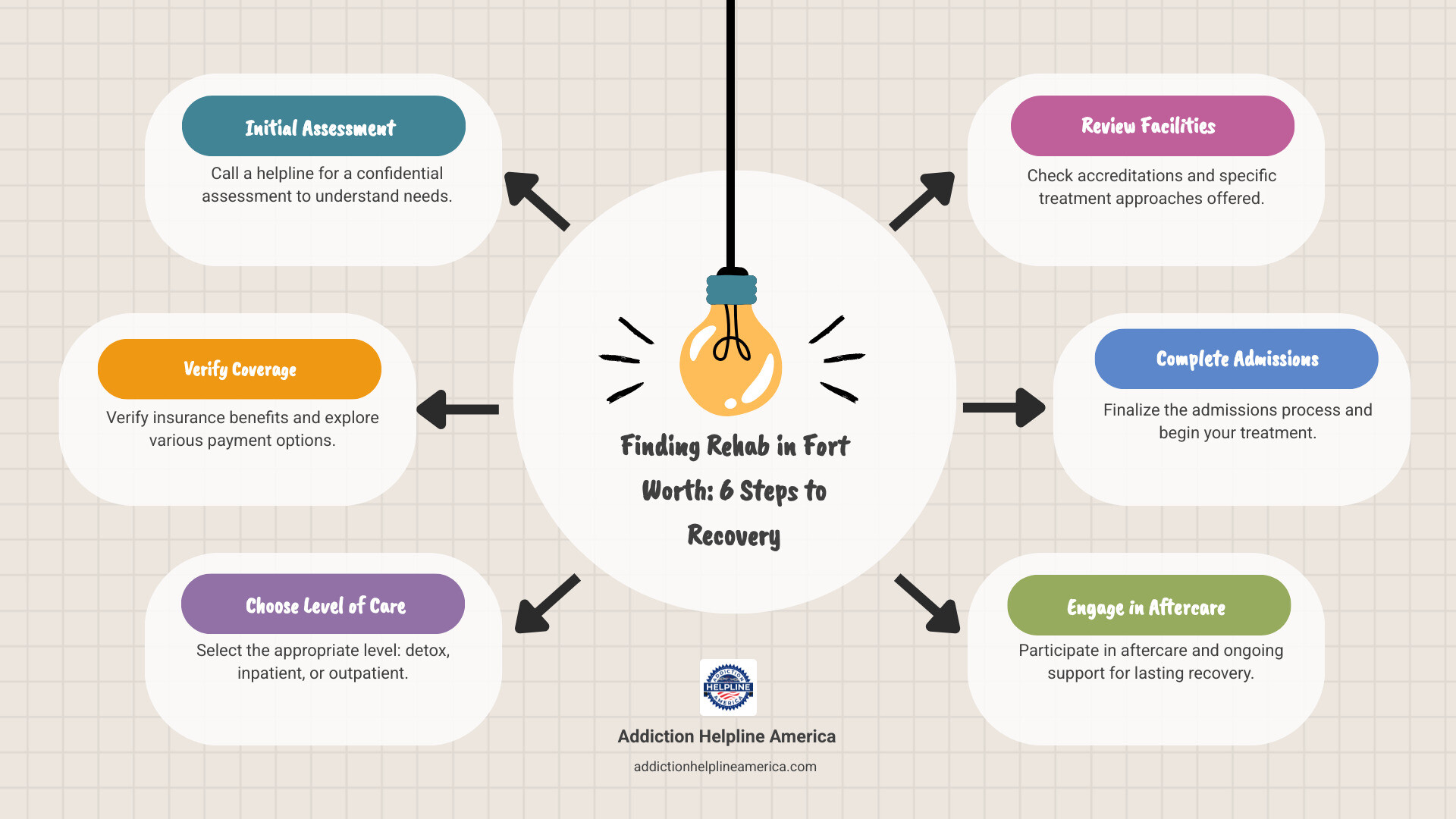
Finding Hope and Healing: Your Guide to Drug Rehab Centers in Fort Worth
If you or a loved one is struggling with addiction, drug rehab centers in Fort Worth offer a vital path to recovery. While the statistics are sobering—drug overdoses are a leading cause of accidental death in Tarrant County—there is hope. The Dallas-Fort Worth area has a robust network of treatment facilities ready to help.
Finding the right program can feel overwhelming. This guide simplifies the process, covering key topics like:
- Levels of Care: From medical detox and inpatient treatment to flexible outpatient programs.
- Treatment Approaches: Evidence-based therapies, dual diagnosis care, and specialized tracks.
- Payment Options: Navigating insurance, including Medicaid and private plans, and finding financial assistance.
Choosing the right rehab is a critical decision. The right fit can make all the difference in achieving lasting recovery. At Addiction Helpline America, we provide confidential, 24/7 guidance to help you find a quality drug rehab center in Fort Worth that matches your unique needs. Our mission is to remove the confusion and provide a clear path forward.
Drug rehab centers in fort worth helpful reading:
- how much are drug rehab centers
- what drug rehab centers accept medicaid
- comprehensive rehab programs
Understanding the Addiction Landscape in Fort Worth
Like many American cities, Fort Worth faces a serious struggle with addiction. Understanding the local landscape helps reinforce that you are not alone and that effective help is available through drug rehab centers in Fort Worth.
The statistics for Tarrant County paint a clear picture of the need for accessible treatment:
- Substance Use Disorder (SUD): Approximately 8% of the local population meets the criteria for a SUD, yet only about 10% of Texans who need help receive it.
- Alcohol Abuse: About 17% of adults in Tarrant County report binge drinking, and alcohol-induced deaths remain a significant concern, matching the state average.
- Drug Overdoses: The crisis has worsened, with drug overdoses becoming the leading cause of accidental death in Tarrant County in 2021. The rise of fentanyl, a powerful synthetic opioid often mixed into other drugs, has made the situation even more dangerous.
Despite these challenges, there is reason for hope. Tarrant County is home to dozens of licensed treatment facilities, with hundreds more in the greater Dallas-Fort Worth area. These centers offer a full spectrum of care, from medical detox to outpatient therapy and specialized programs. Choosing a local facility means building a recovery foundation within the community where you will live your new, sober life.
Navigating the Levels of Care in Fort Worth
Addiction treatment is not one-size-fits-all. Drug rehab centers in Fort Worth use a continuum of care model, providing the right level of support at the right time. This individualized approach ensures your treatment plan adapts to your changing needs, supporting lasting recovery.
Medical Detoxification
Recovery often begins with medical detox, where your body safely clears itself of substances under medical supervision. Withdrawal from substances like alcohol, opioids, and benzodiazepines can be dangerous without professional oversight. In a detox center, a medical team manages symptoms with medication and monitoring to ensure your safety and comfort. Detox typically lasts 7 to 10 days and is a critical first step, but it must be followed by further treatment to address the root causes of addiction.
Inpatient/Residential Treatment
Inpatient or residential treatment provides 24/7 structured care in a supportive, substance-free environment. By living at the facility, you are removed from daily triggers, allowing you to focus completely on healing. Programs typically last 30 to 90 days and include a structured routine of individual therapy, group counseling, and wellness activities. This immersive setting offers constant support from staff and peers, which is crucial for building a strong foundation in early recovery.
For more information about our network of drug rehab centers in Fort Worth and to explore inpatient options that might be right for you, visit our dedicated page: More info about Addiction Helpline America’s network of drug rehab centers in Fort Worth.
Outpatient Programs
Outpatient programs offer flexibility, allowing you to live at home and maintain work, school, or family commitments while attending treatment. This option is ideal for those with a stable and supportive home environment. Levels of intensity vary:
- Partial Hospitalization Programs (PHP): The most intensive option, requiring 20+ hours of treatment per week.
- Intensive Outpatient Programs (IOP): A step down, typically involving 9+ hours of therapy per week.
- Standard Outpatient: The most flexible option, with fewer weekly hours custom to your needs.
Aftercare and Sober Living
Recovery is a lifelong journey that continues after a formal program ends. Aftercare provides ongoing support to help you steer daily life and prevent relapse. Key components include:
- Alumni Programs and Support Groups: Connecting with peers through groups like AA, NA, or SMART Recovery.
- Continued Counseling: Ongoing therapy to reinforce coping skills.
- Sober Living Homes: Structured, substance-free housing that provides a transitional step between residential treatment and independent living.
A quality rehab will help you create a comprehensive aftercare plan to ensure long-term success.
Key Factors for Choosing Drug Rehab Centers in Fort Worth
Choosing the right drug rehab center in Fort Worth is a deeply personal decision. To find a program that aligns with your needs and sets you up for success, consider these key factors.
Accreditations and Licensing
Accreditations are a mark of quality, indicating that a center meets high standards for safety and care. Look for credentials from respected bodies like The Joint Commission or CARF International. At a minimum, any legitimate facility must be licensed by the Texas Health and Human Services Commission (HHSC). You can often verify a facility’s accreditation online, giving you peace of mind that you’re choosing a reputable provider.
Treatment Approaches and Specializations
Effective treatment is grounded in proven methods. Look for centers that use evidence-based therapies like Cognitive Behavioral Therapy (CBT), which helps change negative thought patterns, and Dialectical Behavior Therapy (DBT), which teaches emotional regulation.
Many individuals also need specialized care:
- Dual Diagnosis Treatment: For those with co-occurring mental health conditions like depression, anxiety, or PTSD, integrated treatment that addresses both addiction and mental health is essential for recovery.
- Holistic Therapies: Many centers complement traditional therapy with activities like yoga, art therapy, meditation, or equine therapy to heal the mind, body, and spirit.
- Faith-Based Programs: For individuals who find strength in spirituality, some programs integrate faith principles into the recovery process.
- Substance-Specific Tracks: Some facilities offer specialized programs for addictions to opioids (including Medication-Assisted Treatment or MAT), alcohol, or other specific substances.
Facility Amenities and Environment
The setting where you heal can significantly impact your recovery. Consider whether you would prefer a private or shared room, as both have benefits. Recreational activities like fitness centers and outdoor spaces are not just extras; they are important tools for reducing stress and building healthy habits. A serene, calm environment—whether it’s a quiet campus or a natural setting—can provide the space needed to focus on getting well. Some centers also offer luxury amenities or executive programs for those with specific needs. The best environment is one where you feel safe, supported, and able to engage in the work of recovery.
Paying for Rehab: Costs, Insurance, and Financial Assistance
Financial concerns are valid, but don’t let them be a barrier to getting help. Treatment is an investment in your future, and there are many ways to make it affordable.
Understanding the Cost of Drug Rehab Centers in Fort Worth
The cost of drug rehab centers in Fort Worth varies based on several factors:
- Level of Care: Inpatient and residential programs cost more than outpatient options due to 24/7 care, housing, and meals.
- Program Duration: A 90-day program will have a higher total cost than a 30-day program, though longer stays often correlate with better outcomes.
- Amenities: Facilities with private rooms, gourmet dining, or specialized therapies will be priced higher than more basic centers.
Remember to weigh these costs against the high price of untreated addiction, which can include lost income, legal fees, and health crises.
Using Insurance for Treatment
Thanks to the Affordable Care Act, most health insurance plans cover addiction treatment.
- Private Insurance: The majority of Texas rehabs accept private insurance from major providers like Aetna, Blue Cross Blue Shield, Cigna, and United Healthcare. It’s important to verify your specific plan’s coverage for deductibles and out-of-pocket maximums.
- Medicaid and Medicare: These government-funded plans provide crucial coverage for many, with about half of Texas facilities accepting Medicaid.
- Veterans’ Benefits: TRICARE and VA programs offer coverage for veterans and their families seeking addiction treatment.
The insurance verification process can be confusing. Our team can confidentially verify your benefits and explain your coverage in simple terms.
Finding Financial Assistance for Drug Rehab in Fort Worth
If out-of-pocket costs are a concern, other options are available. Many facilities offer sliding scale fees, which adjust the cost based on your income. State-funded programs and grants from non-profit organizations can also make treatment affordable or even free for those who qualify.
Addiction Helpline America specializes in navigating these financial options. We can help you find facilities that accept your insurance, offer payment assistance, or align with your budget. Our goal is to ensure that cost does not prevent you from getting the help you need.
The Admissions Process: How to Get Started
The admissions process for drug rehab centers in Fort Worth is confidential and supportive. Understanding the steps can help ease any anxiety about getting started.
Initial Call and Pre-Assessment
Your journey begins with a confidential phone call to a helpline like ours or directly to a treatment center. An admissions specialist will listen to your story and ask about your substance use, medical history, and mental health to assess your needs. This conversation helps determine the right level of care, whether it’s detox, inpatient, or outpatient treatment. Our team at Addiction Helpline America is available 24/7 to guide you through these initial steps.
Insurance Verification and Travel Planning
After the pre-assessment, the admissions team will help with the practical details. They will verify your insurance coverage to determine what your plan covers and explain any out-of-pocket costs. If you are employed, the Family and Medical Leave Act (FMLA) may provide job-protected leave for treatment, allowing you to focus on recovery without worrying about your job.
For residential programs, the center can often assist with travel arrangements. You will receive a packing list, which typically includes:
- Photo ID and insurance card
- Comfortable clothing (adhering to a dress code)
- Unopened, alcohol-free hygiene products
- Prescribed medications in their original bottles
To minimize distractions, personal electronics are usually limited. We are here to walk you through every step, ensuring you feel supported and prepared for the journey ahead.
Frequently Asked Questions about Fort Worth Rehabs
It’s natural to have questions when considering drug rehab centers in Fort Worth. Here are answers to some common concerns.
Can I lose my job for going to rehab?
No, you generally cannot be fired for seeking addiction treatment. Federal laws like the Americans with Disabilities Act (ADA) and the Family and Medical Leave Act (FMLA) offer protections. FMLA allows eligible employees to take up to 12 weeks of unpaid, job-protected leave for medical care, including rehab. This allows you to focus on recovery without the fear of losing your job.
Do rehabs in Fort Worth treat co-occurring mental health disorders?
Yes, many facilities offer dual diagnosis treatment. Addiction and mental health conditions like depression, anxiety, or PTSD are often intertwined. An integrated approach that treats both simultaneously is crucial for lasting recovery. A quality rehab will assess for co-occurring disorders and create a comprehensive treatment plan to address your whole health.
What is the difference between inpatient and outpatient rehab?
The main difference is the living arrangement and intensity of care.
- Inpatient (or Residential) Rehab: You live at the facility 24/7 in a structured, supervised environment, away from daily triggers. This is ideal for severe addiction or for those needing a high level of support.
- Outpatient Rehab: You live at home and attend scheduled therapy sessions at the facility. This flexible option works well for those with strong support systems and personal or professional responsibilities.
The best choice depends on your individual needs. We can help you determine which level of care is right for you.
Conclusion: Taking the First Step Towards Recovery
Seeking information about drug rehab centers in Fort Worth is a courageous first step toward a new life. While the challenges of addiction in Tarrant County are significant, recovery is possible and happens every day.
The key is finding the right fit. Whether you need the structure of an inpatient program, the flexibility of outpatient care, or specialized dual diagnosis treatment, the best program is one that aligns with your personal needs. This choice is critical for achieving lasting sobriety.
Making this decision can feel overwhelming, but you don’t have to do it alone. At Addiction Helpline America, we remove the barriers to finding help. We offer free, confidential, 24/7 guidance to connect you with quality programs in Fort Worth. Our team will listen to your story, answer your questions, and help you steer everything from insurance to treatment options.
Don’t wait. The possibility of change is real, and help is available now. Reach out today to take the first step on your recovery journey.
Find the right drug and substance abuse treatment program for you
Our helpline is 100%
free & confidential
If you or someone you care about is struggling with drug or alcohol addiction, we can help you explore your recovery options. Don’t face this challenge alone—seek support from us.
Programs
Resources
Will my insurance
cover addiction
treatment?
We're ready to help
Find the best
drug or alcohol treatment
center
Are you or a loved one struggling with addiction? Call today to speak to a treatment expert.
















